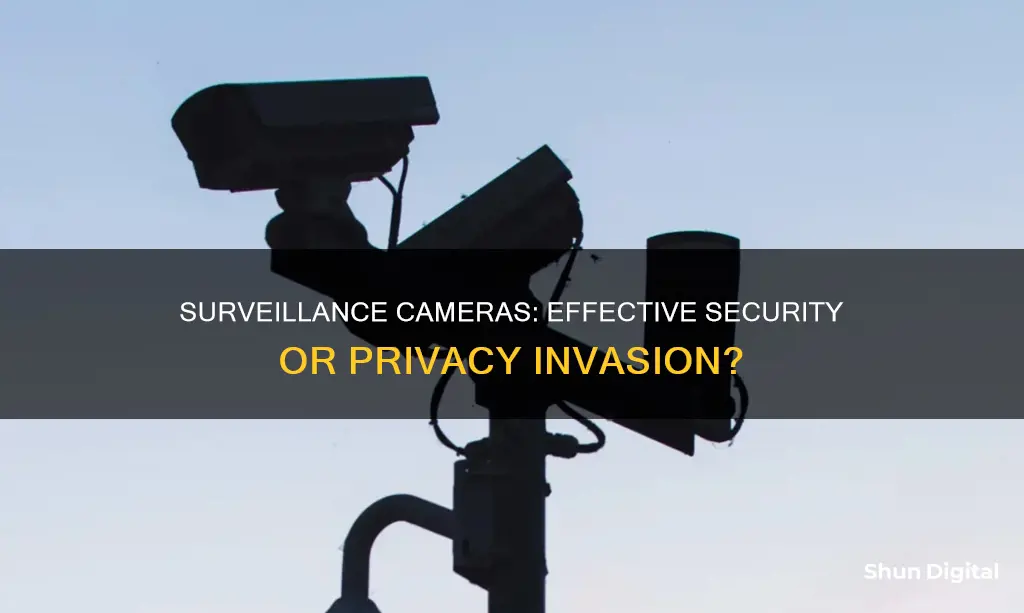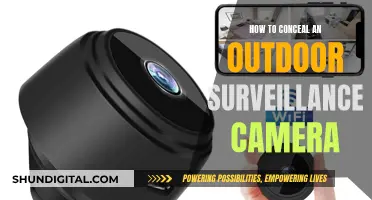
The effectiveness of surveillance cameras in preventing crime is a highly debated topic. While some argue that they are an invasion of privacy, others claim that they are necessary for deterring and solving crimes. Surveillance cameras have been shown to prevent burglaries and their presence often leads criminals to target other locations without visible cameras. In addition, if a crime does occur, the footage can help identify the culprits. However, there are also studies that show conflicting results, with some areas experiencing an increase in crime after the installation of CCTV cameras. Overall, while surveillance cameras can be a useful tool, they are most effective when combined with other security measures such as lighting, security guards, and defensible space.
| Characteristics | Values |
|---|---|
| Crime deterrence | Surveillance cameras are generally effective in deterring crime, especially when combined with other measures such as improved lighting, security guards, and defensible space. |
| Crime detection | Cameras can help detect and identify criminals, but they are not foolproof and may have technical failures or limitations in certain conditions. |
| Crime displacement | There is mixed evidence on whether surveillance cameras displace crime to other areas. Some studies suggest a reduction in overall crime rates, while others show an increase in specific areas or types of crimes. |
| Cost-effectiveness | The cost of surveillance cameras can be high, but they may be worth the investment for the added security and potential savings in insurance costs. |
| Privacy concerns | Surveillance cameras can invade privacy and be susceptible to hacking, but most citizens in study areas reported feeling safer with cameras installed. |
| Effectiveness in specific areas | Surveillance cameras are particularly effective in reducing vehicle crimes, especially in parking garages and residential areas. |
What You'll Learn

Surveillance cameras are most effective when combined with other deterrents
Surveillance cameras are generally effective in deterring and reducing crime. However, their effectiveness increases when combined with other deterrents and crime-reducing methods. Here's why:
The Power of Multiple Deterrents
While surveillance cameras can be incredibly useful in preventing crimes, combining them with other security measures can create an even stronger deterrent. This could include improved lighting, security guards, or defensible space. Well-lit areas, for instance, can make it more likely that a criminal will be spotted, and security guards can respond immediately to any suspicious activity.
Reducing the Risk of Technical Failures
One of the limitations of relying solely on surveillance cameras is the possibility of technical failures. As the Surveillance Studies Centre at Queen's University found, technical issues can prevent evidence from being used in criminal trials. By having additional security measures in place, you reduce the risk of losing crucial evidence due to camera malfunctions.
Making the Most of Your Investment
Surveillance cameras can be a significant investment, and while they can provide excellent security, combining them with other deterrents ensures you get the most out of your money. A comprehensive security system that includes alarms, lighting, and cameras can be more cost-effective than relying on a single method.
Deterring a Wider Range of Crimes
While surveillance cameras are effective in reducing certain types of crimes, such as vehicle crimes in parking garages, they may not be as successful in preventing violent crimes. By adding other deterrents, you can create a more robust security system that targets a broader range of criminal activities.
Strengthening the Message of Security
Visible security cameras are a clear message to potential criminals that they are being watched. However, by adding other security measures, you reinforce this message. A well-lit area with security guards and a clear line of sight to potential targets makes it more challenging for criminals to find weak spots or plan their escape routes.
In conclusion, while surveillance cameras are effective on their own, combining them with other deterrents creates a more robust and reliable security system. This multi-layered approach not only strengthens the message of security but also ensures that you have multiple methods of protection, deterrence, and evidence collection.
The Olympus OM-1 35mm Camera: A Vintage Photography Icon
You may want to see also

Surveillance cameras are a good investment for commercial spaces
Additionally, security cameras can help to identify culprits in the event of a crime, increasing the chances of successful prosecution. This was evident in Orange County, New Jersey, where surveillance cameras led to a 50% drop in all crime types and aided the police in investigating and prosecuting offenders.
For commercial property owners, security cameras also help to reduce vandalism and malicious property damage, resulting in maintenance and repair cost savings. They can also monitor employee performance, ensure staff safety, and improve workplace safety by identifying hazards.
Furthermore, security cameras can enhance a business's reputation and customer confidence. Customers are more likely to feel safe and trust a business that has visible security measures in place. This is especially important for establishments with high foot traffic, such as parking spaces, restaurants, and retail stores.
Lastly, commercial security cameras can lead to reduced insurance premiums and simplified claims processes, providing additional financial benefits to business owners.
While there may be concerns about the cost and privacy implications of security cameras, the benefits they offer make them a valuable investment for commercial spaces, providing an extra layer of security and peace of mind.
Powering Up: Replacing Camera Batteries for a Fresh Start
You may want to see also

Surveillance cameras can help lower insurance rates
Many insurance companies offer discounts for homeowners or business owners who install security cameras and systems. These discounts can vary from 5% to 20% and are often provided when security cameras are paired with alarm systems, motion sensors, and professional monitoring services. Insurance companies recognize that homes or businesses with security cameras are less likely to be targeted by criminals, reducing the number of claims made. As a result, insurance companies are incentivized to offer lower insurance rates to customers who invest in security cameras.
In addition to lowering insurance rates, surveillance cameras offer other benefits. For example, in the event of a break-in or burglary, security cameras can provide valuable evidence to support insurance claims. This helps insurance companies verify the legitimacy of the claim, speeding up the claims process and reducing the likelihood of fraud.
However, it is important to note that not all insurance companies offer discounts for security cameras alone. Some companies may require additional security measures, such as alarm systems, smoke detectors, or sprinkler systems, to be in place before offering a discount. Additionally, the specific type of security camera and its features may also impact the insurance rate. For example, insurance companies may offer higher discounts for cameras with infrared or night vision capabilities, as they provide clearer footage during low-light conditions.
To determine if surveillance cameras can help lower insurance rates, it is recommended to contact insurance providers directly and inquire about their specific policies and requirements. It may also be beneficial to compare quotes from multiple insurance companies, as the discounts and requirements for security cameras may vary across providers.
In conclusion, while surveillance cameras can help lower insurance rates in some cases, it is not a guarantee. The effectiveness of surveillance cameras in reducing insurance rates depends on a combination of factors, including the type of camera, the insurance company's policies, and the presence of complementary security measures. Homeowners and business owners should carefully consider their options and consult with insurance providers to make informed decisions regarding the installation of surveillance cameras.
The Obscura Camera's Ancient Origins: A Historical Overview
You may want to see also

Surveillance cameras are an invasion of privacy
The use of surveillance cameras is a highly debated topic, with some arguing that they are an invasion of privacy, while others claim they are necessary for security. While the primary purpose of surveillance cameras is to enhance security and deter crime, there are valid concerns about their potential to infringe on individuals' privacy and civil liberties. Here are several paragraphs discussing the argument that surveillance cameras are an invasion of privacy:
Surveillance cameras have become an increasingly common feature in public spaces and streets across the United States. This proliferation of cameras is often justified by the need to prevent terrorism and reduce crime. However, the effectiveness of video surveillance in achieving these goals is questionable. In the case of suicide attackers or terrorists, they are clearly not deterred by the presence of cameras and may even view them as a means to gain media attention. Additionally, the cost of implementing and maintaining extensive video surveillance systems can be substantial, and the benefits they provide may not always justify the expense.
One of the main issues with surveillance cameras is their potential for abuse and misuse. Law enforcement officials with access to these systems may use them for criminal or unethical purposes, such as blackmail or spying on individuals for personal or political reasons. There have been instances where surveillance databases were used to stalk women, threaten motorists, or track estranged spouses. The operators of these systems may also exhibit discriminatory behavior, as evidenced by studies showing that people of color were disproportionately targeted by camera operators in Great Britain. The predominantly male operators have also been found to use the cameras for voyeuristic purposes, invading the privacy of women in public spaces.
Surveillance cameras can also infringe on individuals' reasonable expectation of privacy. In the United States, citizens are entitled to privacy, and various rules govern the use of video and audio recordings on private and public properties. For example, recording inside a property in private areas such as bathrooms or bedrooms is considered a breach of privacy. Similarly, recording in public areas that are considered private, such as changing rooms or hotel rooms, is also a violation. The use of hidden cameras or cameras placed without the consent of individuals being recorded is another concern.
The lack of clear limits and controls on the use of advanced surveillance systems, such as closed-circuit television (CCTV), is troubling. As technology advances, there is a danger of mission creep, with surveillance capabilities expanding beyond their original purpose. For instance, the authorities may be tempted to install high-resolution cameras that can read from a significant distance, detect wavelengths outside the visible spectrum, or be equipped with facial recognition technology. Without legally enforceable rules and a societal consensus on the acceptable use of these systems, there is a significant risk of abuse and a chilling effect on public life.
In conclusion, while surveillance cameras can provide some security benefits, they must be balanced against the potential invasion of privacy and the dangers of abuse and misuse. It is essential to have checks and balances in place to prevent the infringement of civil liberties and protect the reasonable expectation of privacy for all individuals.
Crafting Fujifilm Cameras: An Insightful Look at Manufacturing
You may want to see also

Surveillance cameras do not deter all criminals
Surveillance cameras are generally effective in deterring and reducing crime, especially burglaries. However, it is important to acknowledge that they may not deter all criminals. While the presence of security cameras can discourage some criminals, others may still choose to engage in illegal activities despite the risk of being recorded.
For instance, in a study by the Lincoln Police Department, cameras placed in a downtown bar street in Lincoln, Nebraska, did not help identify or deter criminals. During the period the cameras were operational, 128 assaults occurred within 500 feet of the surveillance area. This example illustrates that while surveillance cameras can be a powerful tool, they are not a guarantee against criminal activity.
Another factor to consider is the proper functioning of the cameras. Queen's University's Surveillance Studies Centre examined camera systems from 2001 to 2003 and found 168 technical failures that prevented evidence from being used in criminal trials. This highlights the importance of regular maintenance and proper functioning to ensure the effectiveness of surveillance cameras.
Additionally, the placement and visibility of cameras play a crucial role in their deterrence value. Burglars often consider the presence of security cameras when selecting a target, so visible cameras can make them less likely to choose a particular home or area. However, this also means that hidden or poorly placed cameras may not have the same deterrent effect.
Furthermore, combining surveillance cameras with other security measures, such as lighting, alarms, and security signs, can enhance their effectiveness. Research suggests that CCTV is most effective when paired with improved lighting, security guards, or defensible space. Therefore, relying solely on surveillance cameras may not provide comprehensive protection against all types of crimes.
In summary, while surveillance cameras can be a valuable tool in deterring and reducing crime, they may not deter all criminals. The effectiveness of these systems depends on various factors, including proper functioning, strategic placement, and the use of complementary security measures. To maximize their impact, it is essential to integrate surveillance cameras into a comprehensive security plan that addresses multiple aspects of crime prevention.
How Cameras Auto-Focus on Subjects: A Nice Feature Explained
You may want to see also
Frequently asked questions
Surveillance cameras are generally effective in deterring crime. Research has shown that surveillance cameras can reduce crime by up to 50%. They are particularly effective when combined with other security measures such as lighting and alarms.
Criminals do not want to be seen or recorded, so they are less likely to target a place with visible surveillance cameras.
Surveillance cameras can help prevent burglaries and make it easier for the police to identify and apprehend offenders. They can also lead to lower insurance rates as they make properties less of a target for criminal activity.
Surveillance cameras can help prevent burglaries, vandalism, and malicious property damage, which can result in maintenance and repair cost savings. They can also be used to monitor employee performance and ensure staff safety.
Yes, there are privacy concerns with surveillance cameras. For example, hackers may be able to access and upload footage from security cameras. Additionally, the use of surveillance cameras by government agencies has raised concerns about the potential for privacy invasions.







